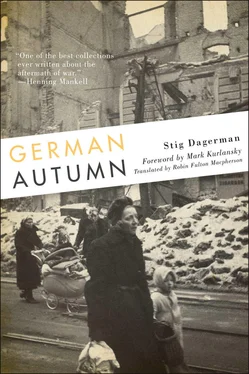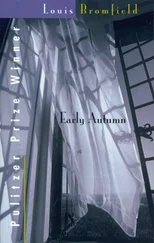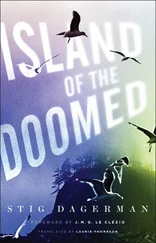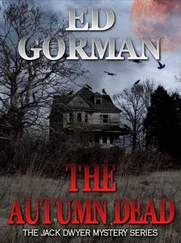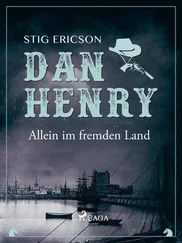This young generation melting away into the Stuttgart night faces a worse fate than any previous one, and in the little drama in which it took part this evening it has perhaps not told the truth about itself or the truth about the events in which willingly or unwillingly it participated, but one thing is clear: it has told the truth about what it thinks of itself and what it thinks of a generation by whom it is both feared and despised in this sad prelude to winter, when big red placards on the walls of ruins promise a reward of fifty thousand marks for information leading to the arrest of those responsible for the attack on Stuttgart’s Spruchkammer .
There is a lack of happiness in post-war Germany but no lack of entertainments. Every day the cinemas run their films to packed houses, all day until nightfall, and they have introduced standing-room in order to meet the demand. On their programmes we can find Allied war films, while in the meantime American experts in militarism search with magnifying glasses for militaristic tendencies in German literature. The theatres probably have the best repertoire in northern Europe and the most eager public in the world, and the dance halls, where for the sake of hygiene the Allied military police make a couple of raids per evening, find their square metres of floor-space overpopulated. But amusing oneself is expensive. Theatre tickets cost cheap time and dear money. Free amusements are rare and must be taken where they are to be found.
A fairly common amusement, in its way, in the American zone, is to attend a Spruchkammersitzung, that is, a session of a denazification court. The man with the rustling sandwich-paper, who with unfailing interest watches case after case rolling past before his seldom wearying eyes, is one of the regulars in the naked courts in half-bombed palaces of justice which lack even a relic of the sadistic elegance with which justice otherwise loves to surround itself. It would be wrong to think that the man with the sandwiches is drawn to the court to savour the tardy triumph of definitive justice. He is more likely to be a theatre enthusiast who has come here to satisfy his craving for the stage. At its best, that is when the prosecutors and the defenders are sufficiently interesting, a Spruch-kammersitzung is really a stately and engrossing piece of drama: with its rapid shifts from past to present, its endless questioning of witnesses where not one tiny action on the part of the accused in the course of the relevant twelve years is considered too trivial to be passed over, the performance can seem like an example of applied existentialism. The atmosphere of dream and unreality in which this ransacking of a whole nation’s regrettable or terrifying memories is carried out has literary associations too. We could well have been transported to the scenes of Kafka’s The Trial: these court-rooms with their half bricked-up windows, their bomb-damaged furniture, and their position high up under the holed roof, are like an illustration from reality of the desolate attic offices where The Trial unwinds.
It is characteristic of the entire situation that a matter so fundamentally serious as denazification should immediately become an event for a theatre critic. But for a stranger, of course, these brief trials, as a rule concluded in a few hours, generate a special interest because with a rare sharpness they give a picture of conditions in the Hitler years, of the motives of those who became Nazis and the courage of those who did not. From the questioning of the witnesses we can feel a cold draught from the time of terror, a fragment of history so far invisible can flare into life for a few short, charged moments and make the air tremble in the raw court-room. For anyone not personally caught up in those desperate years these trials have a terrible documentary fascination, but as a means of denazification they are quite useless. On that point we must accept an opinion universally held by the Germans themselves.
There is indeed a touching unanimity as to the ridiculous and infuriating forms taken by this process. The former Nazis talk provokingly about a barbaric collective punishment. Others think that fines of a few hundred marks are hardly the depth of barbarity but maintain that it is a pure waste of labour keeping this giant apparatus functioning for the sake of minor Party members when the big ones run free. The conveyor-belt technique also undoubtedly gives a dangerous air of the ridiculous to the whole principle of denazification. It was typical of the resulting attitude that in their election propaganda the Communists, parodying the title of Fallada’s well-known novel — Kleiner Mann — was nun} became Kleiner Pg — was nun? — should turn to the small fry of the Nazi Party whose dislike of denazification they tried to collect. According to current usage, moreover, Spruchkammer is no longer called Spruchkammer, but either Bruchkammer (Bruch meaning ‘kaputt’) or Sprichkammer (Sprich meaning ‘talk’).
But talk can also be of interest to anyone wanting to know the truth about the history of those twelve years. One day begins with a humble schoolteacher and ends with a corrupt Nazi official. This is in Frankfurt-am-Main, where die Spruchkammer for once is better than its reputation. This is because there are judges here who are not ashamed of their job, who do not bow and scrape to the accused and who do not mince their words.
The schoolteacher has been summoned as a ‘less tainted’ case. He belonged to the SA but in general did not shine there. He is a well-mannered pale little man who answers all the questions like a Sunday school pupil. He tells the court about his childhood, which was poor and dismal, and about his lifelong desire to be a schoolteacher. He was well on the way to becoming one when Nazism arrived and he was then faced with the bitter choice: dutifully join some Nazi organization and realize his ambition, or give up his future.
‘It was only after great doubts and after long deliberations with my father that I decided to enter such an organization.’
‘But why exactly the SA?’
‘Because it seemed to me that the SA were the least blameworthy.’
‘Die Strasse frei den braunen Bataillonen — do you call that blameless?’ the judge wonders.
But the accused has six witnesses to declare that he is innocent, witnesses who swear that they have never heard him reveal a Nazi turn of mind, witnesses who certify that he listened to foreign radio stations (all of the accused have done that), Jewish witnesses who have seen him behaving in a friendly manner towards Jews (all of the accused have such witnesses — they cost a couple of hundred marks apiece), and a headmaster who certainly never attended any of his lessons but yet is remarkably well-informed about them, and at last a girl from the training college library who declares that the accused is truth-loving, self-sacrificing, dutiful, careful with books and kind towards children and dogs, and who has a small fit of tears when the judge tells her brusquely that that is irrelevant. What weighed most in the acquittal of the schoolteacher was the fact that he conducted a church choir for a whole year after any kind of church activity could be compromising. Even the prosecutor intervenes on behalf of the accused and the case is over.
Then come two typical routine cases, deserving only a sort of absent-minded disappointed response on the part of the man with the sandwich-packet, cases as commonplace as the names of the accused: Müller and Krause. Herr Müller has been a workplace representative for the unsuccessful Nazi trade union movement which over several years and with surprising lack of progress the Nazis tried to stir into life, but witnesses testify that at least he was not guilty of agitation with threats. But on two occasions he wore the union uniform, one of which was on the Saviour’s birthday. On the other hand he has of course listened to foreign radio stations and been kind to a Jewish family. He is sentenced to make reparations to the tune of two thousand marks. The uniform is declared forfeit, and the accused is further fined one suit and one pair of shoes.
Читать дальше
